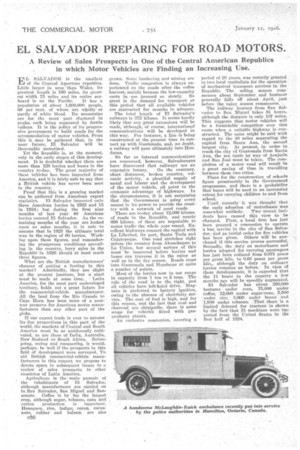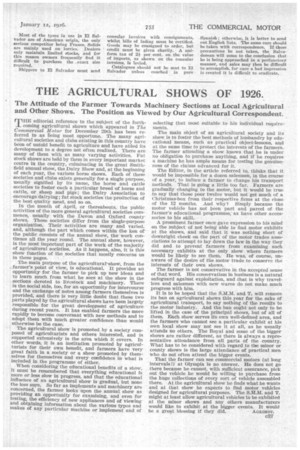EL SALVADOR PREPARING FOR ROAD MOTORS.
Page 20

Page 21

If you've noticed an error in this article please click here to report it so we can fix it.
A Review of Sales Prospects in One of the Central American Republics in which Motor Vehicles are Finding an Increasing Use.
L SALVADOR is the smallest VI of the Central American republics. Little larger in area thanWales, its greatest length is 160 miles, its greatest width '75 miles and its entire sea
board is on the Pacific. It has a Population of about 1,600,000 people, 60 per cent. of whom are wholly or partly of white blood. Its mountains are for the most part clustered in peaks, each being separated by fertile valleys. It is the polies; of its progressive government to build roads for the accommodation of motor vehicles. From this it may be gathered that, in the near future, El Salvador will be thoroughly motorized.
Yet the Republic is, at the moment, only in the early stages of this development. It is doubtful whether there are more than 120 lorries and buses in the country to-day. The greet majority of these vehicles has been imported from America, and it is fairly safe to say that a British vehicle has never been seen in the country.
Proof that this is a growing market can be gathered from American export statistics. El Salvador imported only three American lorries in 1923 and 15 in 1924; but during the first nine months of last year 40 American lorries entered El Salvador. As the remaining months of the year are looked upon as sales months, it is safe to assume that in 1925 the ultimate total was in the region of 60 lorries. Working upon these figures, and remembering the prosperous conditions prevailing in the country, lorry sales in the Republic in 1926 should at least reach three figures.
What are the British manufacturers' chances of getting a footing in this market? Admittedly, they are slight at the present juncture, but a start must be made at some time.. Latin America, for the most part undeveloped territory, holds out a great future for the commercial-vehicle manufacturer. All the land from the Rio Grande to Cape Horn has been more of a postwar preserve for American motor manufacturers than any other part of the globe.
If our export trade is ever to assume its due proportions in this part of the world, the markets of Central and South America must be as assiduously cultivated, as are those of India, Australia, New Zealand or South Africa. Before going, seeing and conqueribg, it would, perhaps, be well if the prospects in this field of development were surveyed. To aid British commercial-vehicle manufacturers in this respect we propose to devote space in subsequent issues to a review of sales prospects in other countries of Latin America.
Agriculture is the main pursuit of the inhabitants of El Salvador, although manufactures are carried on in San Salvador, San Miguel and Sonsonate. Coffee is by far the largest crop, although sugar, tobacco, corn and cotton production is important. Henequen, rice, indigo, cocoa, cocoanuts, rubber and balsam are also grown. Some lumbering and mining are done. Traffic congestion is always experienced on the roads after the coffee harvest, mainly because the low-capacity carts in use proceed so slowly. So great is the demand for transport at this period that all available vehicles are contracted for months in advance.
The total length of El Salvador's railways is 372 kiloms. It seems hardly likely that any great extensions will be made, although, of course, international communications will be developed in this way. For instance; a line is being constructed at the present time to connect up with Guatemala, and, no doubt, a railway will pass ultimately into Minduras.
. So far as internal communications are concerned, however, Salvadoreans have discovered that railways are an expensive luxury. On the contrary, short distances, broken country, volcanic activity, a plentiful supply of metal and labour and the •development of the motor vehicle, all point to the economic advantage of highways. In the circumstances, it is not surprising that the Government is using every means in its power to provide the country with a network of good roads.
There are to-day about 12,000 kiloms. of roads in the Republic, and nearly 600 kiloms. of these are negotiable to motor traffic the whole year round. Excellent highways connect the capital with La Libertad, its port, Santa Tecla and Cojutepeque. One road stretches right across the country from Ahuachapan to La Union, but several sectors of this must lie improved 'before lorries and buses can traverse it in the rainy as well as in the dry seasen. Roads cross into Guatemala and Honduras at quite a number of points.
Most of the lorries now in use range in capacity from 1 ton to 5 tons. The rule of the road is to the right, and all vehicles have left-hand drive. Magneto is preferred to *battery ignition, owing to the absence of electricity service. The cost of fuel is high, and for this reason, and the fact that coal and charcoal are obtaipable, there is some scope for vehicles fitted with gasproducer plants.
An exclusive concession, covering a period of 20 years, was recently granted to two local capitalists for the operation of mechanical transport services in the Republic. The selling season commences about September, and business generally falls off about April, just before the 'rainy season commences. .
The railway journey from San Sal varier to San Miguel takes 84, hours,. although the distance is only 107 miles. This suggests that motor vehicles will be a formidable' competitor over this route when a suitable highway is constructed. The same might be said with regard to the 40 miles separating the capital from Santa Ana, the second largest city. At present, in order to reach the city of Guatemala from Santa Ana, the sea route by way of Acajutla and San Jose must be taken. The completion of a motor road will result in a great saving of time in travelling between these two cities.
Plans for the construction of schools figure prominently in the Government programme, and there is a probability that buses will be used to an increasing extent for carrying children to and from school.
Until -recently • it was thought that the early adoption of motorbuses was
somewhat unlikely. Two -recent incidents have caused this view to be changed. First, a local firm has just been granted a concession to operate a bus service in the city of San Salvador, Eind an initial order for five vehicles has been given. Others will be purchased if this service proves successful. Secondly, the duty on motorbuses and lorries adopted for carrying passengers has just been reduced from 0.075 pesos per gross kilo. to 0.03 pesos per gross kilo., although the duty on ordinary lorries remains as before. In .view of these developments, it is expected that the 11 buses in the country a few months ago will be speedily augmented.
El Salvador has about 260,000 hectares under corn, 75.000 undercoffee, 12,000 under sugar-cane, 5,500 under rice, 5,000 under beans and 1,500 under tobacco. That there is a limited demand for tractors is shown by the factthat 31 machines were imported from the United States in the first half of 1924.
Most of the tyres in use in El Salvador are of American origin, the only serious competitor being France. Solids are mainly used on lorries. Dealers only maintain limited stocks, and for this reason owners frequently find it difficult to purchase the .exact size required.
Shippers to El Salvador must send
consular invoices with consignments, whilst bills of lading must be certified. Goods may be consigned to order, but credit must be given charily. A uniform tar of 2+ per cent. on the value of imports, as shown on the consular invoices, is levied.
Catalogues should not be sent to El Salvador unless couched in pure Spanish ; otherwise, it is better to send out English lists. The same care should be taken with correspondence. If-these precautions be not taken, the Salvadorean will come to the conclusion that he is being approached in a perfunctory manner, and sales may then be difficult to accomplish, for once a bad impression is created it is difficult to eradicate.
































